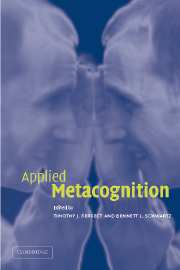Book contents
- Frontmatter
- Contents
- List of contributors
- Preface
- 1 Introduction: toward an applied metacognition
- Part 1 Metacognition in learning and education
- Part 2 Metacognition in everyday memory
- 5 When does eyewitness confidence predict performance?
- 6 Autobiographical memories and beliefs: a preliminary metacognitive model
- 7 Students' experiences of unconscious plagiarism: did I beget or forget?
- Part 3 Metacognition in different populations
- References
6 - Autobiographical memories and beliefs: a preliminary metacognitive model
Published online by Cambridge University Press: 22 September 2009
- Frontmatter
- Contents
- List of contributors
- Preface
- 1 Introduction: toward an applied metacognition
- Part 1 Metacognition in learning and education
- Part 2 Metacognition in everyday memory
- 5 When does eyewitness confidence predict performance?
- 6 Autobiographical memories and beliefs: a preliminary metacognitive model
- 7 Students' experiences of unconscious plagiarism: did I beget or forget?
- Part 3 Metacognition in different populations
- References
Summary
Returning a rented car, the authors of this chapter tried to remember whose credit card had been imprinted when the car had been picked up. After some thought, the senior author reported a clear memory of giving the rental agent her card, and the junior author concurred that this had happened. Despite this clear shared memory, it was the junior author's card that had been imprinted.
People's memories and beliefs about events that may have happened to them can be true or false, and the consequences of being wrong are often more severe than those in the incident described above. Married couples argue about their divergent memories of past events, politicians are embarrassed when they misremember events that are a matter of popular record, and families can be destroyed when psychotherapy clients develop false memories of childhood abuse.
The central thesis of this chapter is that the answers people give to questions regarding the occurrence of events in their life are based on metacognitive decisional mechanisms. These mechanisms take two factors into account: (a) the information that is available about the event at the moment of the decision; and (b) the metacognitive beliefs that people hold. We maintain that the same decisional mechanisms and metacognitive beliefs that play a role when people have to answer questions about the occurrence of events that actually happened are also involved when people develop false beliefs and memories for events that did not happen to them.
- Type
- Chapter
- Information
- Applied Metacognition , pp. 121 - 145Publisher: Cambridge University PressPrint publication year: 2002
References
- 66
- Cited by



